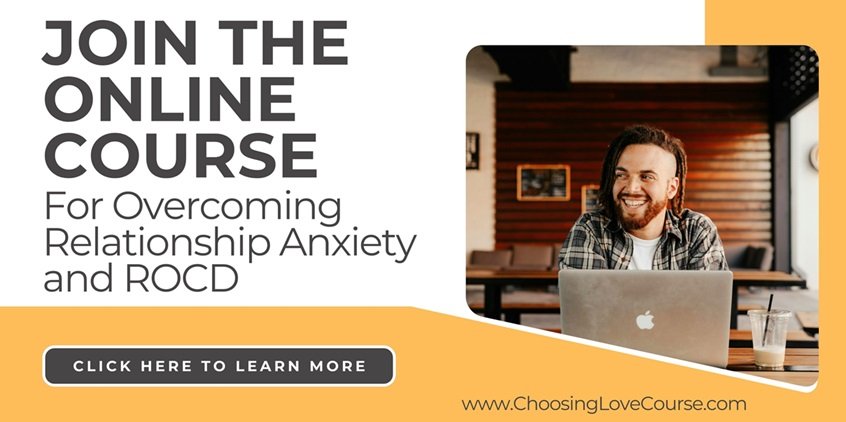Do I Have ROCD?
Do I have ROCD?
Do I have ROCD? You often worry about your relationship and whether your partner is right for you. You’re distressed and confused, and you don’t know what you’re struggling with. You’ve heard of ROCD and wonder if it applies to you.
In this blog post, I walk you through some of the indicators that you may have ROCD. Knowing whether you have ROCD or relationship anxiety lets you choose the right treatment for you.
Please note that you can only arrive at a proper diagnosis through meeting with a licensed mental health professional. Self-diagnosis is not encouraged.
What is ROCD?
ROCD is a cycle of doubting and worrying the rightness or suitability of their relationship or partner.
ROCD is made up of two parts:
Obsessions
Compulsions
Obsessions are intrusive and unwanted thoughts about the rightness of the relationship or partner. Obsessions can cause a lot of distress, as people begin imagining worst-case scenarios of leaving their partner or regretting their choice in the future.
Examples of ROCD obsessions include intense worrying about:
Is this the right partner for me?
What if this is the wrong relationship?
How do I know that this is the right relationship for me?
What if my partner isn’t funny/smart/successful enough?
What if I’m not really attracted to my partner?
Compulsions, on the other hand, are actions taken to reduce the distress caused by obsessions. Common compulsions include reassuring oneself, monitoring how one is feeling, or Googling one’s symptoms.
Obsessions and compulsions work together to create a cycle of distress. Like two halves of a circle, they keep the wheel of ROCD turning.
Do I have ROCD?
To get a sense of whether you might have ROCD, ask yourself the following:
Do I have intrusive thoughts about the rightness of my relationship or partner? (These are the obsessions)
Do I perform compulsions as a way to reduce my distress from these intrusive thoughts? (These are the compulsions)
Do I spend more than one hour each day obsessing and compulsing?
Am I significantly distressed or impaired in some way by these obsessions and compulsions?
If you answered Yes to all four of these, then you may have ROCD. Again, you can only be diagnosed by a licensed mental health professional who takes the time to get to know you and your situation.
Here are a few other indicators to look for:
You’ve already been diagnosed with OCD
You read about OCD and it sounds like what you’re going through
You have family members diagnosed with OCD or other anxiety disorders
Treatments for ROCD
The gold standard treatment for ROCD is Exposure and Response Prevention (ERP).
Remember the bit earlier about obsessions and compulsions forming a self-reinforcing loop? We want to find a way to mess with that loop.
Now, we don’t have control over our obsessions. They just show up, unbidden. That’s why we call them intrusive.
But we do have control over our compulsions - our concrete behaviors.
So, in treating ROCD, one of the things we do is practice having distress without doing compulsions. This can raise anxiety in the short term, yet lead to relief and freedom in the long term.
A metaphor I like to use with clients is to stop running and face the monster. We all have our monsters and we all have our special ways of running from them. For people with ROCD, their monsters are uncertainty (not knowing whether it’s the “right” relationship), fear (“What if I have to break up with my partner?”), and distress (I’m talking about anxiety that gets to a 10 on the Richter scale).
I obtained training in ERP so that I can help clients do this very thing. It is difficult but rewarding work. I love being there with someone when they face their monster and find that the best things in life are on the other side of fear.
Do I have ROCD? - Conclusion
ROCD is a subtype of OCD in which a person obsesses and compulses for at least one hour every day. It causes a lot of distress and/or impairment, and is downright miserable to go through.
ERP is the gold-standard treatment for ROCD. I obtained training in ERP for this very reason: to provide the highest quality of service to my clients.
Meet Cameron
I offer effective, evidence-based treatment for ROCD and relationship anxiety. Through therapy, I help men and women do the personal work needed to have healthy, loving relationships.
I know from personal experience how confusing and terrifying relationship anxiety can be, and how urgent it can feel to figure out if you’re in the right relationship or with the right person. I also know that there’s a way out. My job is to guide people through relationship anxiety.
Reach out for a free consultation to see if I’m a good fit for you.
Or check out my online course here! It’s on-demand, and includes over 3 hours of audio and 10 skills and tools to use in overcoming relationship anxiety and ROCD.
I am a Licensed Marriage and Family Therapist, and I see clients both online and in downtown Oakland, California.


